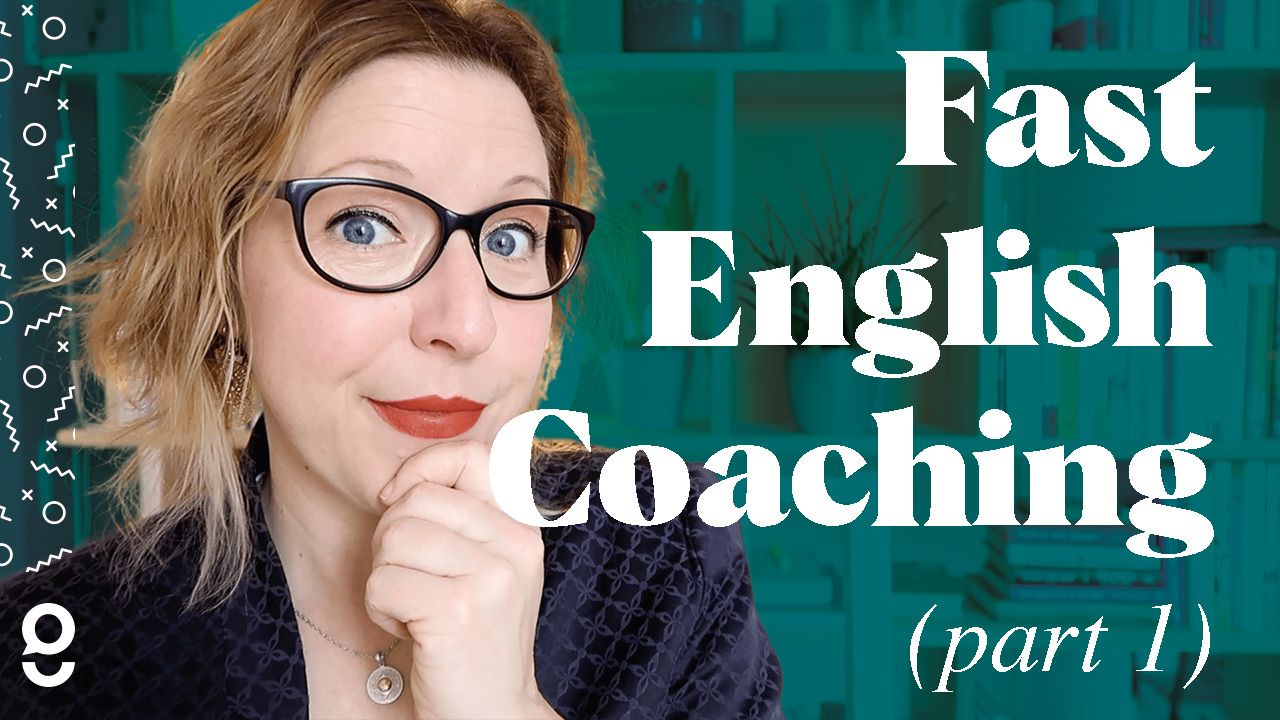
Has this ever happened to you? You’re really, really good at what you do. Competent, hard-working. You’ve got years of experience.
You’ve done great things. And you have amazing business communication skills–in your own language. Only suddenly…the world changes.
The economy changes. And all those great things you know how to do aren’t enough anymore. You’ve got to do it all…in English.
I hear this story a lot in my English coaching sessions. In fact, the story I just told really happened to someone. Then it happened to someone else. Maybe it’s happened to you?
And the more I hear this story, with my English coaching clients, the more I feel passionate about helping you get the business communication skills you need–in English.
Today, I’m really excited to announce a very special 4-part video series that will give you my very best coaching tips. The basics that I use with so many of my clients.
These are strategies you can use to learn ANY business communication skill better–in English.
By the end of this series, you’ll know how to use these smart English coaching strategies so you come away with one real-world skill by the end of the lesson.
And this time, the real-life skill is your elevator pitch. (If you don’t know what that is, you need one, and we’ll talk about that too).
How to use this lesson:
Your skills will improve faster when you focus on one skill at a time. Think small. Think do-able.
So you won’t complete this entire lesson at once–instead, try out one part, find confidence, then come back for more.
And if you’re doing this lesson with me ‘live’ at the time it comes out, you’ll see that the new videos will be posted to this post over the next two weeks. So that you really can focus on one thing at a time.
Don’t miss my next free, interactive workshop & a big announcement.
You’re serious about improving your English and your business skills. And I’m serious about helping you do that.
That’s why I hold workshops every month on business communication skills you need. This month, I’ve got a special one you won’t want to miss that will help you use what you learned in today’s lesson and keep pushing your business communication skills forward.
Want your exclusive monthly invitation? It’s easy. Just sign up for my newsletter.
And at our next workshop, I’ll have a surprise announcement.
Hint: it’s about how you can change your Business English Communication Skills in a few months–instead of a few years. Be the first to hear about it. Just sign up for my newsletter.
What you’ll learn in this article:
1. Coaching in English: My 3-step strategy to fix your English problems at work fast.
2. Let’s try out these English coaching strategies with an awesome introduction to YOUR elevator pitch.
3. Work on ONE business communication skill at a time: Share your expertise & ask for what you want.
4. One last coaching in English tip: The secret to ending your business conversations with success in mind.
5. Coaching in English: once you’re confident with each skill, let’s try the whole pitch.
1. Coaching in English: My 3-step strategy to fix your English problems at work fast.
Why do so many competent business people look for coaching in English when their business communication skills are hurting them professionally?
Because they want to fix the problem–fast!
And when you work with a real business English coach on your business communication skills they will have effective strategies to help you save time and reach your professional goals faster. So what are the three steps my team of expert teachers and I use?
English coaching strategy: Step #1: Remember–you don’t have to be perfect to be good.
Do you know what the first thing I tell my coaching clients is?
You know, when they are under pressure because they might miss a promotion or lose their job because of their English?
Don’t wait until you’re perfect to begin working on your Business Communication Skills in English.
You do NOT have to be perfect at English to be good at what you do.
Your English Coaching Strategy #2: First, work on the skills YOU need for business.
You’re right in the middle of your career. You’ve got a team to lead, meetings to run, and deadlines to meet.
How do you feel when you think about opening a grammar book and spending years learning or re-learning all that English you never learned in school anyway?
It sounds like a waste of time right? Time that you don’t have.
Do NOT start with a standard “learning English” program. Do NOT work from some textbook.
Start with the skills you need right now.
Skills that are holding you back, or stressing you out. (Answering the phone is a big one. Small talk at networking events, for example)
OR focus on skills that would give you new opportunities.
Like being able to pitch your company to international clients.
What exactly are YOUR priorities? Check out today’s video lesson where I’ll ask a few more questions to help you think about that.
Your English Coaching Strategy #3: find a skill that you can improve quickly–that will make a BIG difference in your work.
How do you know what that skill is?
I get it, when you’re feeling stressed out, everything sounds big and difficult in English.
It can be hard to see what you can fix quickly. And what will have the greatest impact.
That’s why a lot of people choose to work with a business English coach. Let me give you an example so you can see how it works:
In today’s video lesson, I tell the story of one of my clients who had to attend professional conferences in English.
As we discussed what stressed her out the most–and what made it hard for her to do her job, the problem seemed huge to her.
But I realized that the biggest impact she could make was by taking a small step:
Learn ONE very relevant business English communication skill. In this case? An elevator pitch…
What’s an elevator pitch? Why do you need one in so many business situations? How can you get started making yours?
Read on to the next lessons.
We’re going to use my 3-part strategy to create your elevator pitch.
One skill at a time.
2. Let’s try out these English coaching strategies with an awesome introduction to YOUR elevator pitch.
Ah, the elevator pitch. Did you know that native speakers have these too?
Imagine you meet someone who can change your career in the elevator.
The idea is to be able to promote yourself, or your company…in just the time you have to ride an elevator with that person. Or in a simple meeting at a networking event. Or when you least expect it.
Because you never know who can change your career…
Why do YOU need an elevator pitch?
Because you will use it again and again in business.
That’s why I have one–in French, and in English!
You can (and should) use an elevator pitch at every training or networking event you attend.
Get this business communication skill ready. It can help you find a new job, or meet new people in your current position, or find new clients.
Start your elevator pitch: One small skill at a time.
Ready to start your pitch? Don’t forget the coaching strategies you learned in the first part of this series.
Start small.
What does that look like? Begin by working on just the introduction to your elevator pitch.
That might sound small, but it will have a great impact on your conversation.
Because when you start with confidence, it makes the rest of the conversation better.
And here is exactly what you can say to introduce yourself in that elevator pitch:
Do you have a specific job title? Maybe you work at a company?
You can say:
“I’m the founder of Business English with Christina. I specialize in helping tech scale-ups build profitable business relationships with Americans.”
What if you’re an entrepreneur or you run your own business?
Try this: I help_____ (who) do___________ (what)
For example:
“I help entrepreneurs create their business plan for their E2 visa application.”
Or…
“I help companies setting up offices in the US with their fiscal & tax policies.
Ok, that’s what I do. But you get the idea.”
Give yourself time to build confidence in this skill…and then try the next one!
Did one of those introductions sound like you?
Take some time to write your own introduction.
Then practice it for a few days. Just a few minutes at a time. Until you can say it without having to think about it.
Then you’ll be ready to go on to the next part in this series…(It’s a really, really important one–that native speakers struggle with too).
Contact me to discuss Business English coaching for your company.
Do you need coaching that is truly flexible and customized around your company’s current projects and priorities? If so, get in touch with me or a member of my team directly.
We’ll help you create a targeted coaching plan that works directly with your team toward meeting your business’s current goals–on their schedule.
And before you commit to any coaching program, ask if you can speak to the owner and head coach about your team’s specific training program.
Your team deserves personalized strategies–and it starts with your first contact.
3. Work on ONE business communication skill at a time: Share your expertise & ask for what you want.
There are two secrets for creating a powerful pitch to promote yourself or your company:
- Talking about the value you can bring to the situation.
- Asking for what you want.
I’ve got suggestions for how you can work on these two important and doable communications skills below. With examples of exactly what to say–in English.
But what if you want to hear this in English?
Be sure to watch the video lesson. These examples are inspired by some of my latest clients’ situations. Maybe one of these can help you!
How to talk about the value you bring to a business situation:
What should you talk about when explaining how you can help a client, a new company, or even your own team solve a problem?
That depends on your background and the situation, of course.
But typically you would mention:
- your experience,
- how many years you’ve been in the business,
- your latest achievements,
- your education.
How about some examples?
Let’s say you run a small business that provides a service to other businesses.
You could talk about your latest project:
“Our company specializes in helping tech companies raise seed funding. We just finished helping DataBot raise 3 million dollars to launch their product on the American market.”
What if you’d like to evolve within your current company?
If you’ve got a great new idea and want to show how you (or your department) have the expertise to carry it out, try something like this:
“My team and I have been working on innovative medical equipment that is small enough to move from lab to lab. We’ve just completed our latest design for our biggest client and I think we’re ready for the next phase of testing.”
How to ask for what you want like a pro:
Now it’s time to ask for what you want.
Here’s a business communication tip:
- start by showing you know the company and its needs,
- then ask for what you want–clearly.
Here’s an example:
“I love how engaged MedInc is in making healthcare accessible, and I’d love the chance to put my experience to work for your company.”
So, now you know how to talk about your expertise and ask for what you want.
Are you ready for my secret tip for ending your business conversations on a strong note?
Read on…
Don’t miss my next free, interactive workshop.
You’re serious about improving your English and your business skills.
And I’m serious about helping you do that. That’s why I hold workshops every month on business communication skills you need.
Want your exclusive monthly invitation? It’s easy. Just sign up for my newsletter.
4. One last coaching in English tip: The secret to ending your business conversations with success in mind.
Let’s talk about one of my favorite coaching in English tips.
It’s a way to make sure you’ll hear a ‘yes’ after your pitch.
Ok, so let’s say you just made a great new contact at a networking event. Now you want to follow up. You don’t want them to forget you–or what you talked about.
Try using a quick Call to Action. Or CTA. It gives your contact a specific action or next step that they can take–or that you will take.
Here’s a very simple CTA that lets you follow up.
“It was nice talking to you. And I’ll send you a quick follow-up email later today about a contact at MedInc.”
If you were talking to someone about how your business can help theirs.
You could end your conversation like this:
“It was great to talk to you. I’d love to send you some details about how we could help your company.”
And if you’ve just shared a great new idea to help a company where you already work you could say:
“Could we meet in the next few weeks to discuss how this new project could work for our company–and maybe set up a timeline for our work?”
5. Coaching in English: once you’re confident with each skill, let’s try the whole pitch.
Congratulations! You’ve learned a LOT in this lesson.
-
- You learned the 3-step process to learning ANY new business communication skill–in English.
- And you applied those lessons so you could work on a complex (and essential) business communication goal skill: one skill at a time.
Now is the time to put everything together. What does an entire pitch sound like?
Read on to see an example of a great pitch–in English. And don’t forget to watch part 4 of our video lesson, to hear what this sounds like in English.
Start with your introduction:
“Hello, I’m Christina, It’s nice to meet you. I’m the founder of Business English with Christina, which specializes in helping tech scale-ups build profitable business relationships with Americans.”
Share the value you can bring:
We just finished helping Global Med raise $50 million to expand their presence in the American market.”
Now ask for what you want:
“I read that PerfectCorp is growing too. My team and I would love to help you talk to American investors who could help your business to expand into new markets.”
And don’t forget the call to action!
“It was nice talking to you. I’d love to send you some details about how we could help your company.”
And I think you’ve already noticed that when you promise to send someone details, you have to actually write the email. So how do you do that? I’ve got you covered…
What’s next? I know, that follow-up email! And I’ve got a workshop just for you.
You’re serious about improving your English and your business skills. And I’m serious about helping you do that. That’s why I hold workshops every month on business communication skills you need. This month, I’ve got a special one you won’t want to miss that will help you use what you learned in today’s lesson and keep pushing your business communication skills forward–by perfecting your emails in English, so you can follow up on your great conversation. Want your exclusive monthly invitation? It’s easy. Just sign up for my newsletter.
And at our next workshop, I’ll have a surprise announcement. Hint: it’s about how you can change your Business English Communication Skills in a few months–instead of a few years. Be the first to hear about it. Just sign up for my newsletter.
Take the next step for your English and your Business:
Improve your English in the comments:
The best way to become more confident using Business English is to practice!
Here’s your Confidence Challenge for this week:
- In the comments, tell us about one thing you’d love to feel confident doing in English.
Further reading for professionals in English
Curious to learn more about the topic of the day? I’ve selected this excellent resource for you. It helps native speakers who want to improve their business skills by working with a coach.
- Forbes: The Dos And Don’ts Of Working With A Coach
- Inc: 6 Signs You Need a Coach
- The New York Times: Um, Uh, Like Call in the Speech Coach!
Become more fluent & comfortable in conversations
If you would like to take the next step with me, discover my Faster Fluency Conversation Club Membership Program!
It helps you become more confident speaking in conversations, and get a lot more vocabulary on many different topics! And it’s a fabulous community of “English buddies” from around the world!
TIP: Use the code FFCC40 to save -40% off your 1st month of membership!
More details at
https://mybusinessenglishcourses.com/faster-fluency-conversation-club/join-now
Can’t wait to see you in the Club,
Christina
More good stuff…
Click the image to learn more







